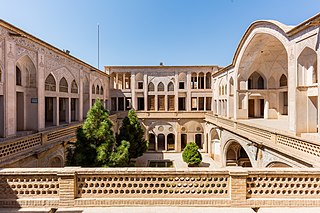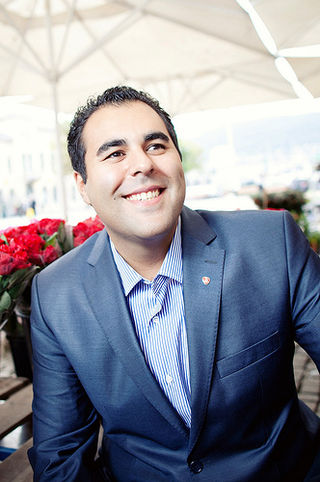Related Research Articles

Persian, also known by its endonym Farsi, is a Western Iranian language belonging to the Iranian branch of the Indo-Iranian subdivision of the Indo-European languages. Persian is a pluricentric language predominantly spoken and used officially within Iran, Afghanistan, and Tajikistan in three mutually intelligible standard varieties, namely Iranian Persian, Dari Persian and Tajiki Persian. It is also spoken natively in the Tajik variety by a significant population within Uzbekistan, as well as within other regions with a Persianate history in the cultural sphere of Greater Iran. It is written officially within Iran and Afghanistan in the Persian alphabet, a derivation of the Arabic script, and within Tajikistan in the Tajik alphabet, a derivation of the Cyrillic script.

Iran, also known as Persia and officially as the Islamic Republic of Iran, is a country located in Western Asia. It is bordered by Iraq and Turkey to the west, by Azerbaijan and Armenia to the northwest, by the Caspian Sea and Turkmenistan to the north, by Afghanistan and Pakistan to the east, and by the Gulf of Oman and the Persian Gulf to the south. It covers an area of 1.64 million square kilometres, making it the 17th-largest country. Iran has an estimated population of 86.8 million, making it the 17th-most populous country in the world, and the second-largest in the Middle East. Its largest cities, in descending order, are the capital Tehran, Mashhad, Isfahan, Karaj, Shiraz, and Tabriz.

The Iran–Iraq War was an armed conflict between Iran and Iraq that lasted from September 1980 to August 1988. It began with the Iraqi invasion of Iran and lasted for almost eight years, until the acceptance of United Nations Security Council Resolution 598 by both sides. Iraq's primary rationale for the attack against Iran cited the need to prevent Ruhollah Khomeini—who had spearheaded Iran's Islamic Revolution in 1979—from exporting the new Iranian ideology to Iraq; there were also fears among the Iraqi leadership of Saddam Hussein that Iran, a theocratic state with a population predominantly composed of Shia Muslims, would exploit sectarian tensions in Iraq by rallying Iraq's Shia majority against the Baʽathist government, which was officially secular and dominated by Sunni Muslims. Iraq also wished to replace Iran as the power player in the Persian Gulf, which was not seen as an achievable objective prior to the Islamic Revolution because of Pahlavi Iran's economic and military superiority as well as its close relationships with the United States and Israel.

Iranian architecture or Persian architecture is the architecture of Iran and parts of the rest of West Asia, the Caucasus and Central Asia. Its history dates back to at least 5,000 BC with characteristic examples distributed over a vast area from Turkey and Iraq to Uzbekistan and Tajikistan, and from the Caucasus to Zanzibar. Persian buildings vary from peasant huts to tea houses, and garden pavilions to "some of the most majestic structures the world has ever seen". In addition to historic gates, palaces, and mosques, the rapid growth of cities such as the capital Tehran has brought about a wave of demolition and new construction.
Traditional Persian residential architecture is the architecture employed by builders and craftsmen in the cultural Greater Iran and the surrounding regions to construct vernacular houses. The art draws from various cultures and elements from both Islamic and pre-Islamic times.

Bagh City is the chief town and district headquarters of Bagh District, in Azad Kashmir, Pakistan. The town is situated on the confluence of two nullahs (streams), Malwani and Mahl at the distance of 93 km from Muzaffarabad.

The Abbāsi House is a large historic house museum in Kashan, Iran. It was built during the late 18th century and belonged to a wealthy glass merchant. It is partly converted into a teahouse, a traditional restaurant, and a small shop. Other such houses, including the Borujerdi House and the Tabātabāei House, are located nearby.
Basian, also known as Abbasian, is a town in Abbottabad District of Khyber Pakhtunkhwa province of Pakistan, it is located at 34°04′24″N 73°29′41″E and has an average elevation of 660 metres (2168 feet).

Mohammad Reza Pahlavi, more well known in the west as Mohammad Reza Shah, was the last Shah (King) of the Imperial State of Iran from 16 September 1941 until his overthrow in the Islamic Revolution on 11 February 1979. Owing to his status, he was usually known as the Shah.
Kharal Abbasian is a village north-east of Bagh District headquarters in Pakistan.
Persepolis Football Club Academy are the youth team of Persepolis Football Club. They currently play in the AFC Vision Asia Youth Premier League, the highest level of youth football in Iran.

Masud Gharahkhani is a Norwegian politician who has served as the President of the Storting since 2021, and as an Member of the Storting for Buskerud since 2017 for the Labour Party.
Deh Abbasan is a village in Jalalvand Rural District, Firuzabad District, Kermanshah County, Kermanshah Province, Iran. At the 2006 census, its population was 107, in 23 families.
The 2014 AFC Futsal Club Championship was the 5th AFC Futsal Club Championship. It was held in Chengdu, China 25–30 August 2014.
Jajja Abbasian Railway Station is located in khanpur district Rahim Yar Khan Pakistan. This railway station was built by Nawab Sadiq who was Nawab of Bahawalpur.

The Khazeni family, Khazeni-Rad and Khazenifar family was a prominent Iranian industrial and mercantile family, active in Iran from the Qajar dynasty. Throughout the 20th century the main activities of the family were the manufacture and distribution of steel and fabrics products through its company The Cheltenham Company, which included the import of Japanese Iron and commodities such as cotton.
Moein Abbasian is an Iranian defender who currently plays for Iranian football club Havadar in the Persian Gulf Pro League.
Abbasian Wala is a small village located in Union council Haitu in Kalurkot Tehsil Bhakkar District, Punjab, Pakistan.
Khanpur–Chachran Railway was one of several branch lines in Pakistan, operated and maintained by Pakistan Railways. The line began at Khanpur Junction and ended at Chachran. The total length of this railway line is 33 kilometers (21 mi) with 4 railway stations.

Seyed Abolfazl Jalali Bourani is an Iranian professional footballer who plays as a defender for Persian Gulf Pro League club Esteghlal and the Iran national team.